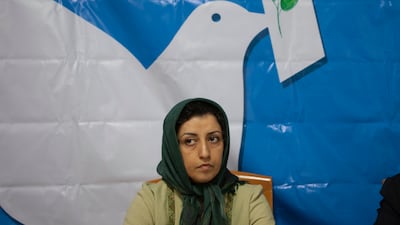Iranian activist Narges Mohammadi became only the 19th woman to win the 122-year-old Nobel Peace Prize on Friday for her campaign against the oppression of women in Iran.
The 51-year-old, who is serving a number of sentences at Tehran's notorious Evin Prison, has been arrested many times in her fight for human rights in the country.
Announcing the award on Friday, Berit Reiss-Andersen, head of the Norwegian Nobel Committee, said the prize was “first and foremost a recognition of the very important work of a whole movement in Iran”, calling Ms Mohammadi “its undisputed leader”.
Who is she?
Born in Zanjan, Iran, Ms Mohammadi studied physics at university and became a professional engineer. She began her career in activism at university, where she wrote articles supporting women’s rights in the student newspaper and was arrested twice during meetings of a political student group.
She later worked as a journalist for several newspapers campaigning for reform and married pro-reform journalist Taghi Rahmani in 1999.
He moved to France, where he still lives with their twin children, in 2012 after serving 14 years in prison.
However, Ms Mohammadi remained in Iran to continue her campaign for human rights.
She has been arrested 13 times, convicted five times and sentenced to a total of 31 years in prison and 154 lashes.
Her latest detention began after she was arrested in 2021 for attending a memorial to a person killed in nationwide protests sparked by an increase in petrol prices.
She is currently serving sentences amounting to about 12 years.
Last month she wrote an opinion piece for The New York Times from behind bars, in which she stated: “What the government may not understand is that the more of us they lock up, the stronger we become.”
In the article, she writes about learning of the death while she was in prison of 22-year-old Mahsa Amini, who was killed by the country’s morality police last year after being detained for not wearing a headscarf.
“In the women’s ward, we were filled with grief – and rage. We used our short phone calls to collect information.
“At night, we held meetings to exchange the news we’d heard. We were stuck inside, but we did what we could to raise our voices against the regime. Anger reached its peak a few weeks later, when a fire swept through part of Evin on October 15.”
She added: “I have been imprisoned in Evin three times since 2012 for my work as a defender of human rights, but I have never seen as many new admissions to the women’s ward there as in the last five months.”
Before being jailed, Ms Mohammadi was vice president of the banned Defenders of Human Rights Centre in Iran, founded by Shirin Ebadi, to whom she is close.
Ms Mohammadi's husband said the prize will embolden her fight for human rights.
Speaking from his home in Paris on Friday, Mr Rahmani added: “But more importantly, this is in fact a prize for the woman, life and freedom movement.

“This prize is for all the people of Iran, for human rights activists.
“Narges and people like her have chosen this kind of life and, if they are supported, their motivation will increase to pursue their goals.”
Her 16-year-old son, who was at school this morning when it was announced she had won, told The New York Times he had checked his phone under the table in class.
“I couldn’t shout in class, but I was so happy,” he said. “We are afraid for my mom everyday. The Nobel Prize is a sign for her to continue straight on, to not abandon the fight.”
Ms Mohammadi has won many accolades, including the Unesco/Guillermo Cano World Press Freedom Prize in May.
In 2022, she won the Reporters Without Borders’ (RSF) Courage Prize, and in 2018 she was awarded the Andrei Sakharov Prize.


